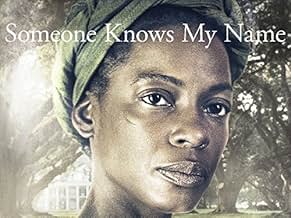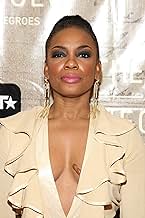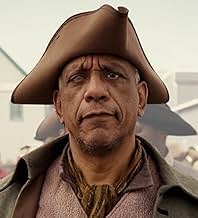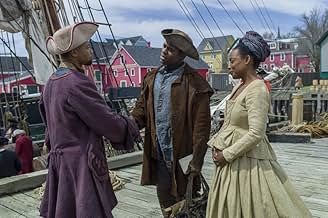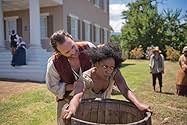The Book of Negroes
- TV Mini Series
- 2015
- 44m
IMDb RATING
7.7/10
2.5K
YOUR RATING
Kidnapped in Africa and subsequently enslaved in South Carolina, Aminata must navigate a revolution in New York, isolation in Nova Scotia, and the treacherous jungles of Sierra Leone to secu... Read allKidnapped in Africa and subsequently enslaved in South Carolina, Aminata must navigate a revolution in New York, isolation in Nova Scotia, and the treacherous jungles of Sierra Leone to secure her freedom in the 18th century.Kidnapped in Africa and subsequently enslaved in South Carolina, Aminata must navigate a revolution in New York, isolation in Nova Scotia, and the treacherous jungles of Sierra Leone to secure her freedom in the 18th century.
- Awards
- 19 wins & 26 nominations total
Browse episodes
Featured reviews
Aminata Diallo (Aunjanue Ellis) is captured from her West African village and sent into slavery. She falls for Chekura, a boy in the slaving party. He in turn is also sold. She is sold to the cruel Robinson Appleby. She resists his advances and eventually has a child with Chekura. Rosa Lindo is a sympathetic white woman but she dies. Her husband Solomon is able to buy Aminata but also brokers the sale of Aminata's child away from Robinson. Aminata escapes from Solomon to live in NYC's Canvas Town during the American Revolution. She is befriended by Revolutionary bar owner Samuel Fraunces (Cuba Gooding, Jr.). Chekura manages to escape and join Aminata. She is also befriended by British Cpt. John Clarkson (Ben Chaplin). At the war's end, she helps to record names of slaves into the Book of Negroes for slaves who supposedly served the British Army for one year and thereby earning their freedom.
It's great for this little mentioned part of history to be made. Also Aunjanue Ellis is a very compelling actress. I can do without Cuba Gooding Jr. doing an accent. Also Rick Roberts doesn't fit my image of General Washington. Aminata directly challenging Washington on slavery seems too obvious and on the nose. It's unrealistic. The story is rushed through a long winding life. I can understand the need for it. However it does feel sometimes like a highlight reel. The production and directions are mostly TV movie level. Ellis is able to elevate the production almost by the sheer power of her will.
It's great for this little mentioned part of history to be made. Also Aunjanue Ellis is a very compelling actress. I can do without Cuba Gooding Jr. doing an accent. Also Rick Roberts doesn't fit my image of General Washington. Aminata directly challenging Washington on slavery seems too obvious and on the nose. It's unrealistic. The story is rushed through a long winding life. I can understand the need for it. However it does feel sometimes like a highlight reel. The production and directions are mostly TV movie level. Ellis is able to elevate the production almost by the sheer power of her will.
The Book of Negroes was an eighteenth century British document detailing all the Afro-Americans who had fought on the British side in the Revolutionary war, and were promised a new life elsewhere. A considerable number ended up in Nova Scotia and New Brunswick. There were problems with the harsh climate and petty racism, but it was better than the alternative.
This program takes its name from that, and the first episode looks quite satisfying, as we trace a black girl's odyssey from Mali to America.
So far, it does not seem much different from Roots, but I will keep watching to see if something original turns up.
This program takes its name from that, and the first episode looks quite satisfying, as we trace a black girl's odyssey from Mali to America.
So far, it does not seem much different from Roots, but I will keep watching to see if something original turns up.
Epic, intense TV series in 6 episodes about a young girl and then adult, depicting an intense dramatization of Aminata Diallo (Aunjanue Ellis), she is abducted from his African village, sold into slavery, and taken to America, her love story with Chekura (Lyriq Bent) who manages to escape and join Aminata, they have a daughter, who is eventually sold away from them , to her liberation. She is also befriended by British Cpt. John Clarkson (Ben Chaplin) and along the ways suffering cruel enslavement. Later on, she migrated from Nova Scotia to Sierra Leone, where they formed the original settlers of Freetown, under the auspices of the Sierra Leone Company. Throughout the series, Aminata efforts to secure her freedom in the eighteenth century, she must navigate a revolution, isolation in Nova Scotia and the treacherous jungles of Sierra Leone. Observing notable events in U. S. history, such as a revolutionary movement in New York, slave uprisings, and emancipation. Her testimony to lead the African-American people into freedom.
The series deals with a young African woman captured in Africa as a child and subsequently enslaved in South Carolina, she is literate and acts as a scribe to record the information about the former slaves. The film packs crude scenes full of brutality and cruelty in which the African-American slaves suffer humiliations, flagellation, beating, degradation and mistreats by their owners Based on the novel concerning a saga of African-American life, in which Aminata witnesses countless atrocities - against herself and his fellow slaves ; being written by Canadian novelist Lawrence Hill, The Book of Negroes, (2007, published in the United States as Someone Knows My Name). It is inspired by the African Americans who were resettled in Nova Scotia, and some of them who later chose to go to Sierra Leone, where they created a colony of freedmen in Africa. The book won the top 2008 Commonwealth Writers' Prize notable African-American. The film displays nice acting talent at the time and several actors were solicited to join the cast. Support is frankly fine, such as : Cuba Gooding Jr, Greg Bryk, Jane Alexander, Ben Chaplin, Dwain Murphy , Allan Hawco, and Louis Gossett Jr. Canadian director Clement Virgo adapted decently the book into a six-hour television mini-series of the same title. The series premiered on CBC in Canada on 7 January 2015 and on BET in the United States on 16 February 2015.
Based on historical events , in fact ¨The Book of Negroes¨ is a document created by Brigadier General Samuel Birch, that records names and descriptions of 3,000 Black Loyalists, enslaved Africans who escaped to the British lines during the American Revolution and were evacuated to points in Nova Scotia as free people of colour. African people were then brought as slaves to Nova Scotia during the founding of Louisbourg and Halifax. The first major migration of African people to Nova Scotia happened during the American Revolution. Enslaved Africans in America who escaped to the British during the American Revolutionary War became the first settlement of Black Nova Scotians and Black Canadians. Other Black Loyalists were transported to settlements in several islands in the West Indies and some to London. Recorded in 1783, this 150-page document is the only one to have recorded Black Canadians in a large, detailed scope of work. The document contains records on 3000 Africans; the former slaves recorded in the Book of Negroes were evacuated to British North America, where they were settled in the newly established Birchtown and other places in the colony. According to the Treaty of Paris (1783), the United States argued for the return of all property, including slaves. The British refused to return the slaves, to whom they had promised freedom during the war for joining their cause.
The series deals with a young African woman captured in Africa as a child and subsequently enslaved in South Carolina, she is literate and acts as a scribe to record the information about the former slaves. The film packs crude scenes full of brutality and cruelty in which the African-American slaves suffer humiliations, flagellation, beating, degradation and mistreats by their owners Based on the novel concerning a saga of African-American life, in which Aminata witnesses countless atrocities - against herself and his fellow slaves ; being written by Canadian novelist Lawrence Hill, The Book of Negroes, (2007, published in the United States as Someone Knows My Name). It is inspired by the African Americans who were resettled in Nova Scotia, and some of them who later chose to go to Sierra Leone, where they created a colony of freedmen in Africa. The book won the top 2008 Commonwealth Writers' Prize notable African-American. The film displays nice acting talent at the time and several actors were solicited to join the cast. Support is frankly fine, such as : Cuba Gooding Jr, Greg Bryk, Jane Alexander, Ben Chaplin, Dwain Murphy , Allan Hawco, and Louis Gossett Jr. Canadian director Clement Virgo adapted decently the book into a six-hour television mini-series of the same title. The series premiered on CBC in Canada on 7 January 2015 and on BET in the United States on 16 February 2015.
Based on historical events , in fact ¨The Book of Negroes¨ is a document created by Brigadier General Samuel Birch, that records names and descriptions of 3,000 Black Loyalists, enslaved Africans who escaped to the British lines during the American Revolution and were evacuated to points in Nova Scotia as free people of colour. African people were then brought as slaves to Nova Scotia during the founding of Louisbourg and Halifax. The first major migration of African people to Nova Scotia happened during the American Revolution. Enslaved Africans in America who escaped to the British during the American Revolutionary War became the first settlement of Black Nova Scotians and Black Canadians. Other Black Loyalists were transported to settlements in several islands in the West Indies and some to London. Recorded in 1783, this 150-page document is the only one to have recorded Black Canadians in a large, detailed scope of work. The document contains records on 3000 Africans; the former slaves recorded in the Book of Negroes were evacuated to British North America, where they were settled in the newly established Birchtown and other places in the colony. According to the Treaty of Paris (1783), the United States argued for the return of all property, including slaves. The British refused to return the slaves, to whom they had promised freedom during the war for joining their cause.
I thought I had found the wrong series when first I saw lead actor Aunjanue Ellis on the DVD jacket-cover with a modern look (including makeup). A far cry from the book's original cover that included a modest, much darker-skinned woman whose look was to reflect that of being enslaved most of her life.
But that's just the start of my experience with this series.
I had read and enjoyed every gritty details of the book, simply because it was raw and heart-breaking, meant to make the reader feel something beyond their grasp. All of the ugly elements and consequences of rape, humiliation, personal loss, just to name a few things that rob someone of their dignity. The series seemed to cater to the ever-sensitive TV viewers who very likely needed to see slaves fully-clothed, clear-skinned, and bright-eyed. The series left out shocking details from the book, such as the infants that were thrown overboard (alive) on the first ship to the Americas. Once again, TV & Film find it too easy to spoon-feed the viewer only as much as they need to.
This series consisted of six episodes. Surely they had some time to show a few shocking moments from the book.
What's more, the very obvious sexual tension between Aminata and Sam seemed to be added for the viewers' pleasure since an absent husband just isn't as romantic.
These details that the readers of the book know about that the viewing audience doesn't makes me wonder if there ever will be a bridge between literature and screen-writing, as we see it time and time again.
I realize that this work is meant to be separate, and that Lawrence Hill did not write the screenplay, but I can't help but wonder why it is so necessary to take a subject as serious as this, during times like we are in now, and water it down with so much Hollywoodism.
My answer for those who read the book and wonder if they'll also enjoy the series?: No. I did give it two stars simply because I did enjoy the cast and for what it's worth, they did a good job. The costuming, cinematography, sound.. all of it good, but just a disappointment when you know how the story goes and end up with so much less than you hoped.
But that's just the start of my experience with this series.
I had read and enjoyed every gritty details of the book, simply because it was raw and heart-breaking, meant to make the reader feel something beyond their grasp. All of the ugly elements and consequences of rape, humiliation, personal loss, just to name a few things that rob someone of their dignity. The series seemed to cater to the ever-sensitive TV viewers who very likely needed to see slaves fully-clothed, clear-skinned, and bright-eyed. The series left out shocking details from the book, such as the infants that were thrown overboard (alive) on the first ship to the Americas. Once again, TV & Film find it too easy to spoon-feed the viewer only as much as they need to.
This series consisted of six episodes. Surely they had some time to show a few shocking moments from the book.
What's more, the very obvious sexual tension between Aminata and Sam seemed to be added for the viewers' pleasure since an absent husband just isn't as romantic.
These details that the readers of the book know about that the viewing audience doesn't makes me wonder if there ever will be a bridge between literature and screen-writing, as we see it time and time again.
I realize that this work is meant to be separate, and that Lawrence Hill did not write the screenplay, but I can't help but wonder why it is so necessary to take a subject as serious as this, during times like we are in now, and water it down with so much Hollywoodism.
My answer for those who read the book and wonder if they'll also enjoy the series?: No. I did give it two stars simply because I did enjoy the cast and for what it's worth, they did a good job. The costuming, cinematography, sound.. all of it good, but just a disappointment when you know how the story goes and end up with so much less than you hoped.
Nice enough reenactments of stories and adventures that could or have happened in the slave period of the englishes. Very english point of view with no subtitles english or french. Rather disappointing from the CBC. Saw it on dvd.
Did you know
- TriviaBased on the name of the book that really existed, that had the names of Negroes who served the British during the Civil War, then were freed and sent to Nova Scotia to live. Publishers changed the name of the book from "Book of Negroes" to "Someone Knows My Name" because the term "Negro" has become a derogatory term to many people in the U.S., and sellers were hesitant to sell a book with that word in the title.
- How many seasons does The Book of Negroes have?Powered by Alexa
Details
- Release date
- Country of origin
- Language
- Also known as
- Someone Knows My Name
- Filming locations
- Production companies
- See more company credits at IMDbPro
Contribute to this page
Suggest an edit or add missing content



